Did closing the gun show loophole actually work?
TL;DR: no
University of Cambridge
Background
Private party gun sales
85% of the guns used in a crime that are recovered by the police were sold at least once through a private party transaction (Wintemute, Braga, and Kennedy 2010).
There is a large and growing black market of guns that are being sold by people who are in the business of dealing and are doing it without a license; and therefore, they are not running background checks the way the law requires. And it is fueling violence.
Steven Dettelbach, ATF Director, 10 Apr 2024
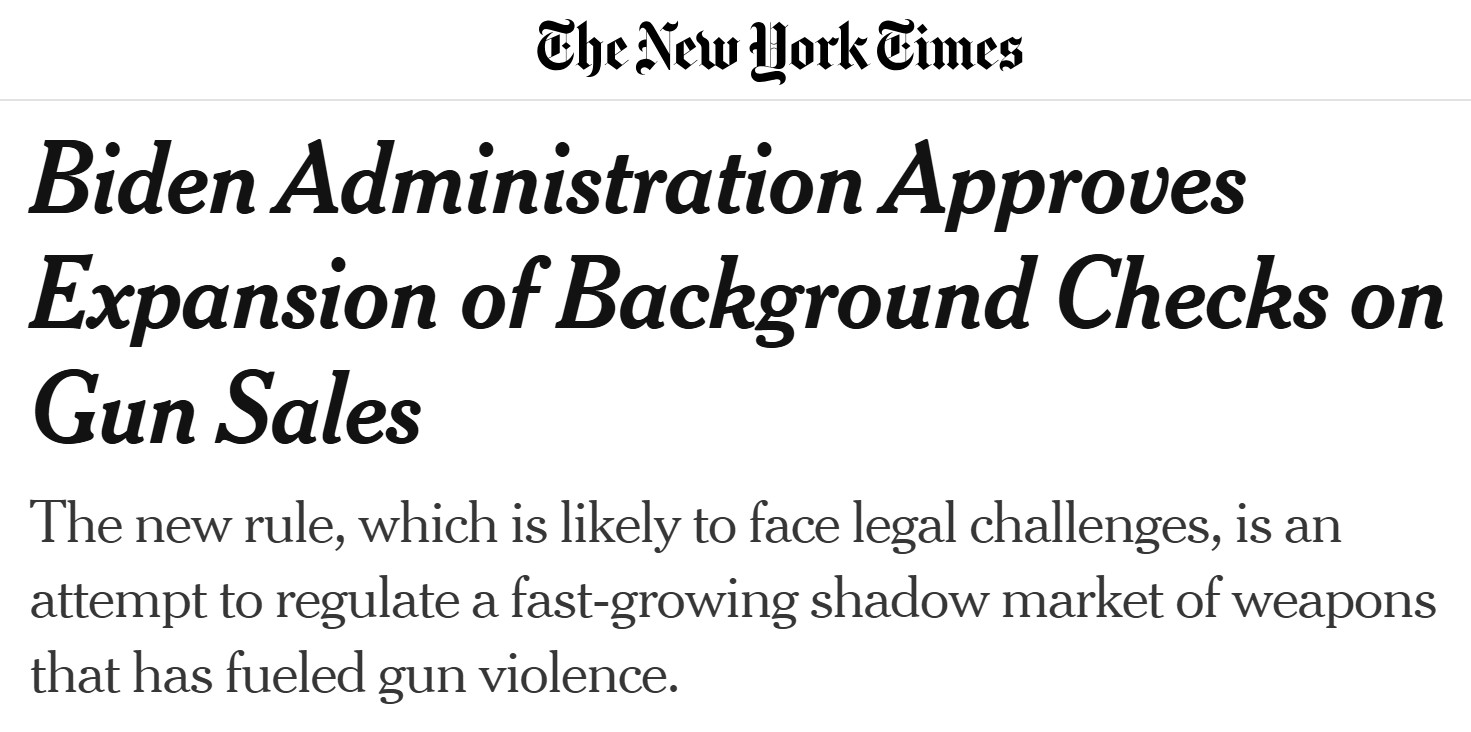
I’ve spent hours with families who’ve lost loved ones to gun violence. They all have the same message: ‘Do something.’ Today, my Administration is taking action to make sure fewer guns are sold without background checks.
President Biden, 10 Apr 2024
Every year, thousands of unlicensed gun dealers sell tens of thousands of guns without a background check, including to buyers who would have failed one – domestic abusers, violent felons, and even children. This single gap in our federal background check system has caused unimaginable pain and suffering. Today, as the head of the White House Office of Gun Violence Prevention, I am proud to say that all gun dealers must conduct background checks no matter where or how they sell.
Vice President Harris, 10 Apr 2024
Not just gun shows
Commercial Dealers
- Anyone “engaged in the business” of selling firearms
- Federal Firearms License (FFL)
- Background checks required
- National Instant Criminal Background Check System (NICS)
Private Sellers
- Anyone else
- No license needed
- Checks in 21 states and DC
- Transacted via FFL holder
- Not required in 29 states
13% of recent firearm purchases in the US occurred without a background check, including 50% of private purchases made… outside of stores
Background checks before May 20

The policy: Redefinition of dealers
You will need a license if you are devoting time, attention, and labor to dealing in firearms as a regular course of trade or business to predominantly earn a profit through the repetitive purchase and resale of firearms… By contrast, if you make only occasional resales of firearms to enhance your personal collection or if you liquidate your personal collection (without restocking), you do not need to be licensed
ATF 2024
Private sellers doing so to earn profit anywhere in the country would be required to obtain FFLs and conduct background checks
The injunction
The policy was announced April 10 and would take effect May 20
A federal lawsuit in Northern District of Texas provided injunctive relief for Texas, Lousiana, Mississippi and Utah
Private sellers in these states would not be required to obtain FFLs or conduct background checks until the lawsuit was finished
Policy landscape after May 20

The gun market
If private individuals are “engaged in the business” of selling, they could…
- Stop selling firearms
- Obtain FFL to continue selling1
- Ignore change and continue selling firearms without a license
Declines in private sales should increase background checks as buyers turn to FFLs
Our focus
Fewer firearms sold without background checks may reduce gun violence
But any effect on violence will only occur through changes in legal gun markets
So we’re focusing on proximal mechanism: effects on legal gun markets
Research Questions
As a result of the rule change…
- Did FFLs increase?
- Did background checks increase?
- Did the volume of gun sales change?
- Did private listings decline?
- Did commercial listings increase?
Research design
Data
- FFL lists from ATF
- Number of new licenses
- NICS background checks from FBI
- Number of background checks for firearm purchases
- Firearm sale listings from Armslist.com
- Number of new private listings
- Number of new dealer listings
Dave K. is leading the first two
I am leading on Armslist
Arsmlist
Craigslist for guns1
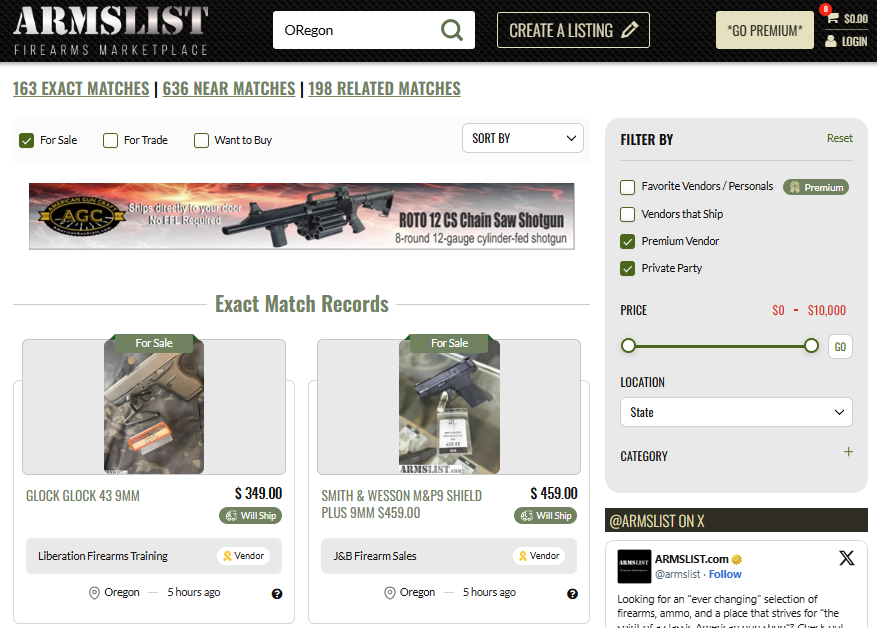
Listings
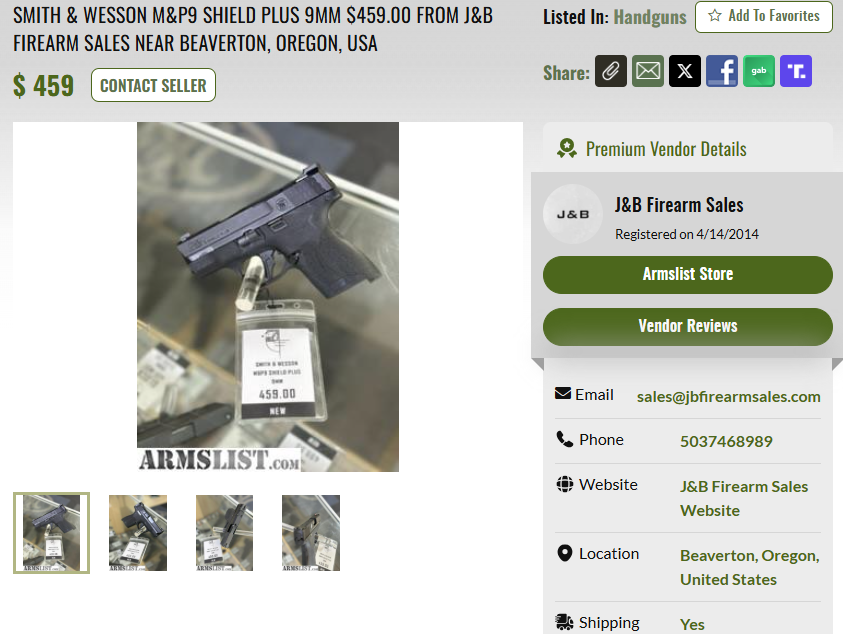
What we want
Measure
State-month counts of new listings for firearms from private sellers and commercial dealers
Key fields
- Date listed
- State
- Type of vendor
- Category, i.e., firearm
Scraper
- Scrape of live listings every few days since 2021
- VPN rotation to evade blocks and region lock
- Relational database for storage
What we got
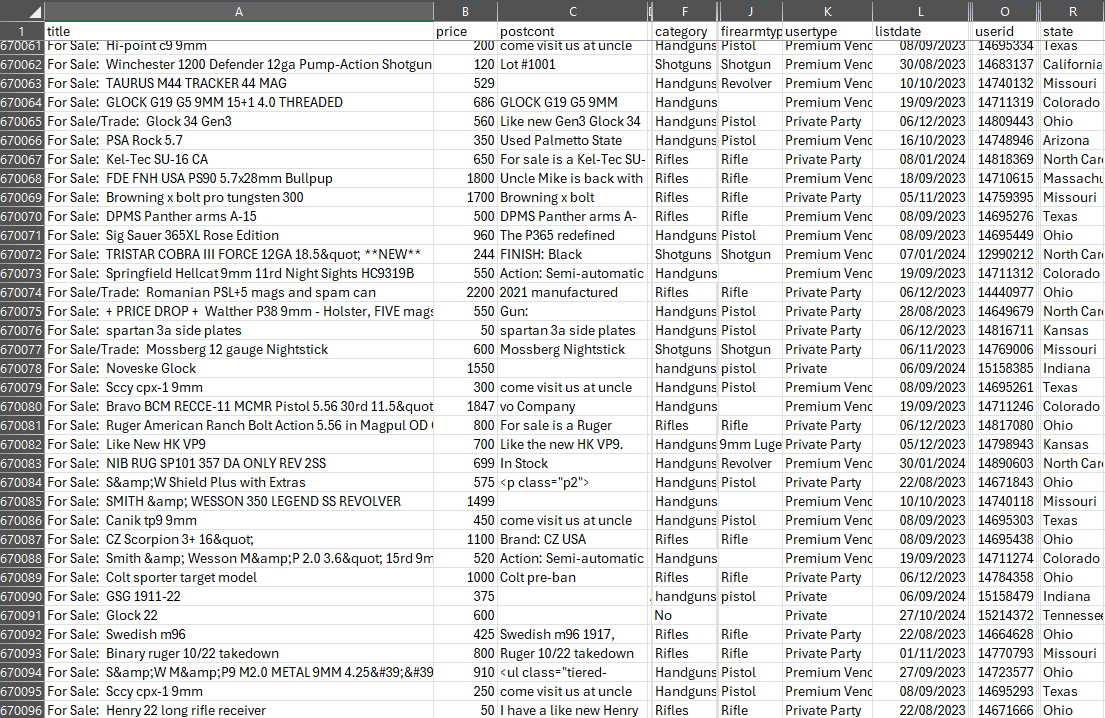
Oh no
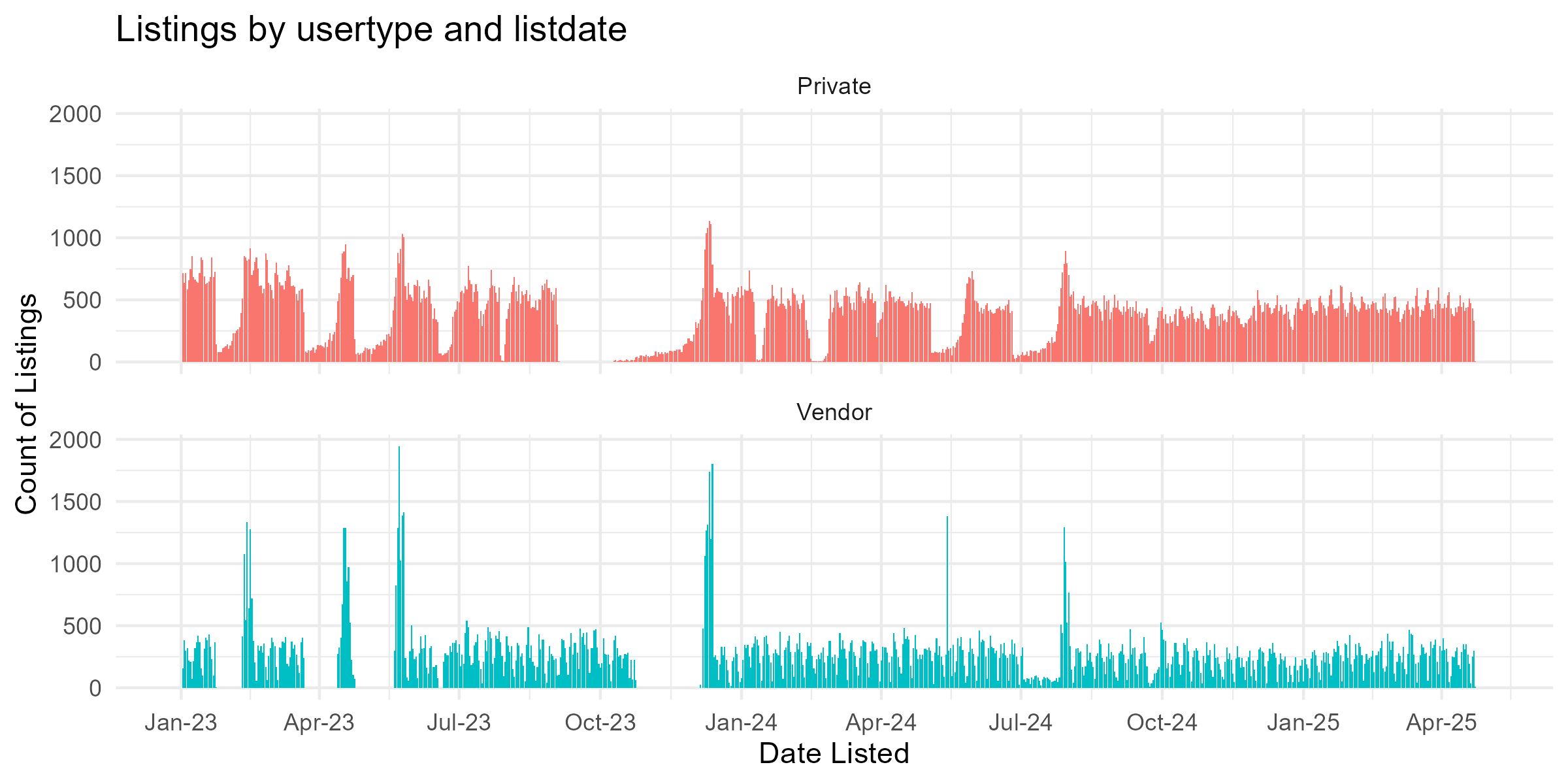
New scraper
- Brute force scraping by post-ID
- There are millions of post IDs
- No idea how long it will take
- No idea if problems will be resolved
We’re doing a pilot now
I really hope it works
FFLs and Background Checks
Basic design
Treatment group: 25 states without universal background checks as of May 20, 2024 and which did not receive injunctive relief
Control group: 21 states and DC with universal checks
Estimand: The average effect of the policy change on the treated states
Identifying Assumption: In the absence of the rule change, the average untreated potential outcomes for treated states and the control group would have followed parallel paths following treatment
Two analyses
Difference-in-differences (DiD)
- Classic TWFE estimator
- Single treatment effect coefficient: ATT across 12 month period
Event study
- ATT in each month before and after rule change
- Can assess parallel trends; should be no lead effects
- Can see timing, e.g., delayed effect or anticipation
Treatment groups

DiD: Poisson pseudo-MLE (PPML)
\[ y_{st} \sim Pois(\mathbb{E}[y_{st}]) \\ \mathbb{E}[y_{st}] = exp(\alpha + \beta D_{st} + \theta_s + \gamma_t) \]
Variables
- \(Y_{st}\): FFLs, checks, or sales
- \(D_{st}\): Treatment indicator
- \(s\): State
- \(t\): Month-year
Parameters
- \(\beta\): Treatment effect
- \(\theta\): State fixed effect
- \(\gamma\): Month-year fixed effect
Event Study PPML
\[ y_{st} \sim Pois(\mathbb{E}[y_{st}]) \\ \mathbb{E}[y_{st}] = exp\left(\alpha + \sum_{k=-12}^{12} \left(\beta_kD_{st}^k\right) + \theta_s + \gamma_t\right) \]
Same as before except:
- \(k\) indexes time from treatment
- \(D_{sk}=1\) for \(k\ge0\)
- \(\beta_k\) is effect for \(k^{th}\) month after rule change
- Pre-intervention: the average difference in the outcome between the control and treated states in each month
- Post-intervention: the average treatment effect for each month
Robustness tests
- Linear TWFE with inverse hyperbolic sine
- Rambachan & Roth (2023) HonestDiD parallel trends test
- ITT analysis including injunction states
- Anticipation: Extend time period to 12 months prior to Bipartisan Safer Communities act on June 22nd, 2022
Results
FFL DiD
| Coef | Std. Err. | |
|---|---|---|
| Treatment | 0.103 | 0.059 |
| Constant | 1.750*** | 0.020 |
| Observations | 1150 | |
| Clusters | 46 |
Tiny insignificant treatment effect
FFL Event Study
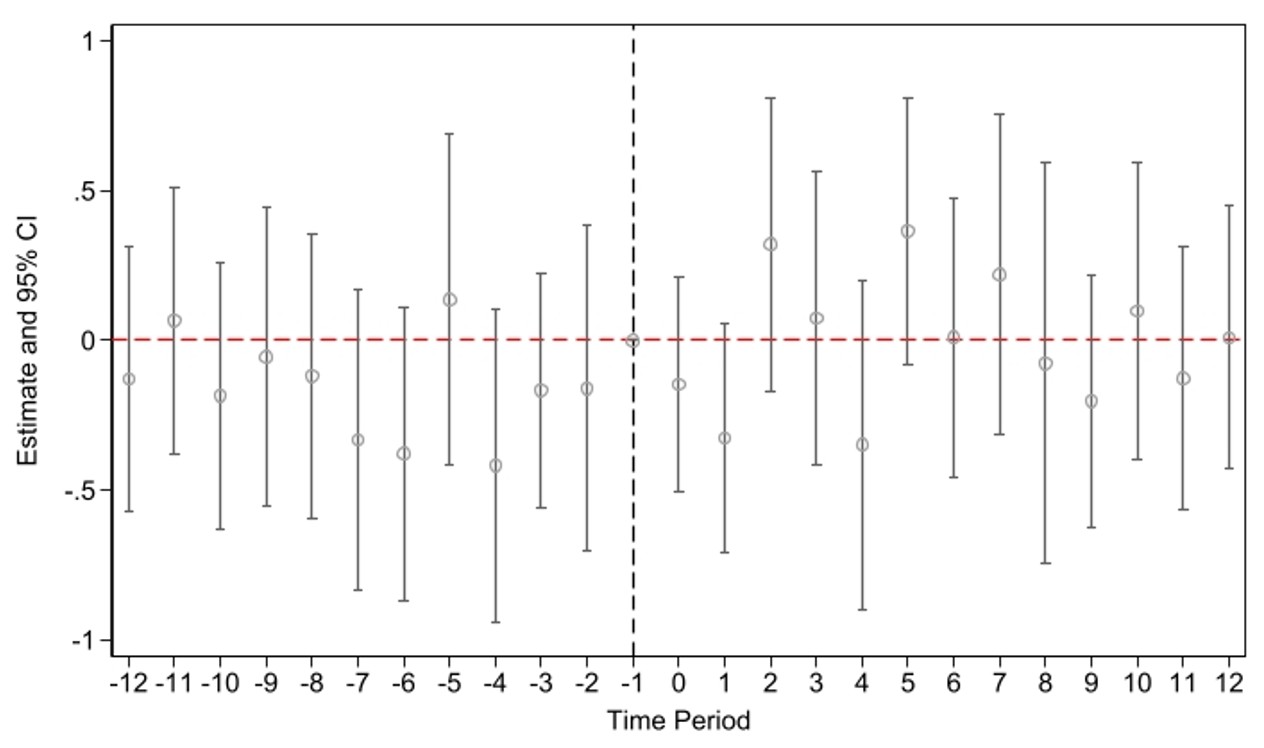
Nothing here either
Checks DiD
| Coef | Std. Err. | |
|---|---|---|
| Treatment | 0.004 | 0.020 |
| Constant | 10.352*** | 0.006 |
| Observations | 1150 | |
| Clusters | 46 |
Near-zero insignificant treatment effect
Checks Event Study
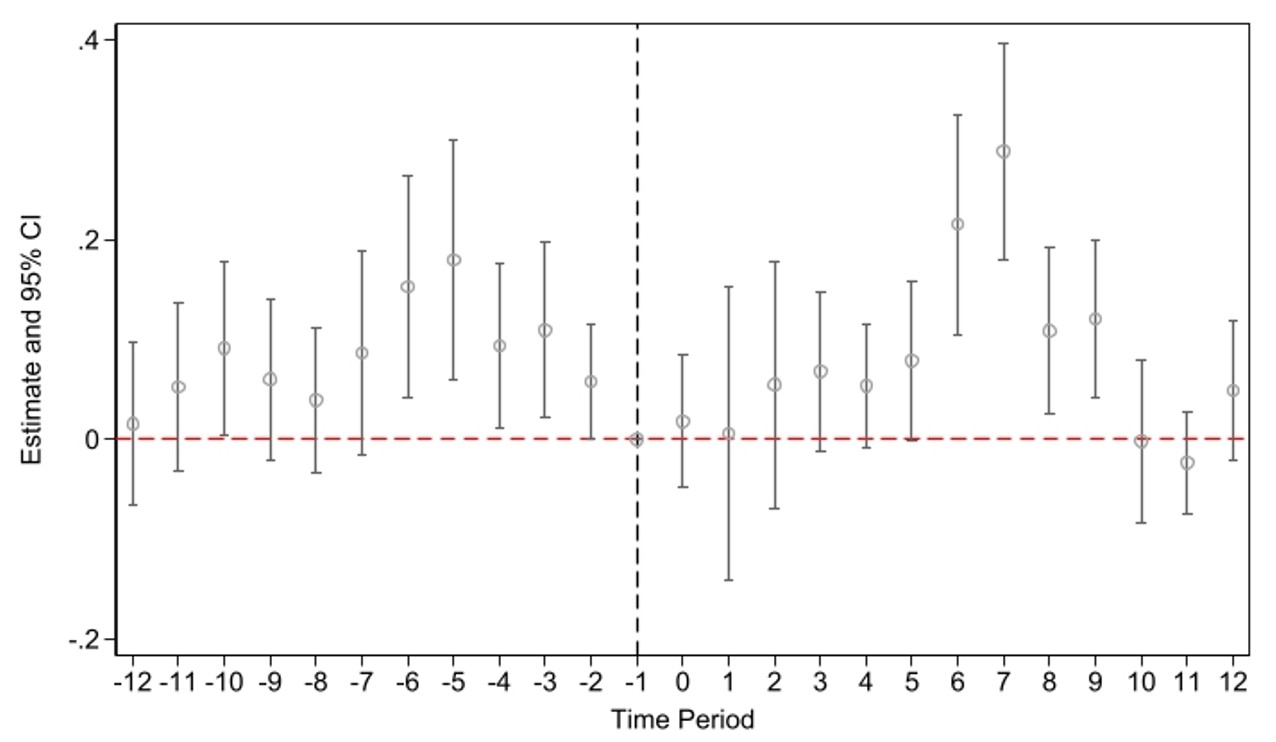
A tiny delayed increase, but estimates are sensitive
Discussion
Why didn’t it do anything?
Candidate explanations:
The nature of the rule change was ambiguous, leading some people to believe that nothing had really changed
The rule change had little deterrent effect because it was minimally enforced, perceived to be minimally enforced, or because sellers were unaware of the change
Few were affected by the rule change; i.e., few private sellers were actually redefined as being “engaged in the business” of dealing firearms to “predominantly earn a profit”.
So I went and looked at gun forums…
Nothing changed
Nothing much has really changed. Private sales are still allowed. I can still post up at a gun show or post a classified to sell off parts of my collection to fund new purchases. The rule doesn’t close a loophole, it just creates (or really mostly restates) the existing rules about straw purchases and operating without a license. The rule was and remains that private sales don’t require a background check. And the people regularly buying and selling guns for a profit, or otherwise acting as straw purchasers, were already breaking the law and continue to be breaking the law, and this rule doesn’t seem to be creating new mechanisms for identifying and stopping those people. So really this seems like a preservation of the status quo… At best I think a bunch of government lawyers got paid to waste a bunch of ink on a rule that will serve as a symbolic but ultimately meaningless gesture to people who want to see politicians do something about gun laws, but don’t fundamentally understand gun laws.
sh1tpost1nsh1t, Reddit r/law
No enforcement
Another common thread: the policy is DOA and will never be enforced
To find out, we FOIAed the ATF for records on investigations and prosecutions for dealing without FFL as per 18 U.S.C. §922(a)(1)(A)
So far no evidence changes:
- 25 cases per month May 2023 to April 2024
- 26 per month in first 7 months of policy
Few actually affected
Perhaps there are few unlicensed people selling “predominately to earn a profit”
Our analysis of online gun markets may be suggestive
Our conclusion
the loophole rule change originated in a 2022 bipartisan act of Congress that was spurred by a Covid-era surge in violence. Yet its impact appears negligible. Whether this failure stemmed from the deeply polarized politics of gun regulation, the toothlessness of ATF, or from targeting to narrow a group of sellers remains unclear. Consequently it seems unlikely that the rule change has had any meaningful impact on broader outcomes like firearm violence.
Feedback
Contact:
Charles C. Lanfear
Institute of Criminology
University of Cambridge
clanfear.github.io
cl948@cam.ac.uk